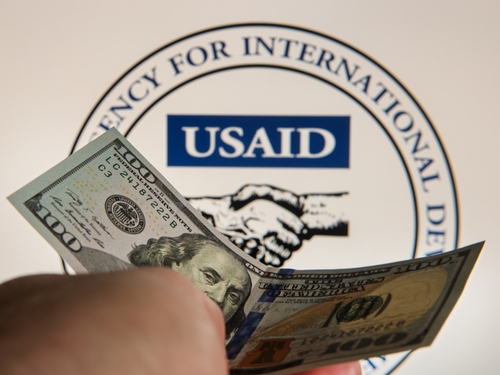Constitutional Law
Lawyer for ABA, foreign-aid recipients tells DC Circuit US must spend appropriated ‘pots of money’
Congress in 2024 “appropriated very specific pots of money for foreign assistance purposes” and required the executive branch to spend the full amount, a lawyer representing the ABA and other groups challenging funding cutoffs said Monday. (Photo from Shutterstock)
Congress in 2024 “appropriated very specific pots of money for foreign assistance purposes” and required the executive branch to spend the full amount, a lawyer representing the ABA and other groups challenging funding cutoffs told the U.S. Court of Appeals for the District of Columbia Circuit on Monday.
The appropriations are mandatory because Congress did not use discretionary language, lawyer Daniel Jacobson of the Jacobson Lawyers Group told the D.C. Circuit. “Not a single [appropriation] says, ‘up to’ or ‘no more than,’” Jacobson said.
Courthouse News Service and Law.com covered arguments by Jacobson and Sean Janda, the U.S. Department of Justice lawyer representing the government.
The funding freeze is only temporary, Janda said, as the government tries “to figure out which of these funds it should reprogram, how it should reprogram them.” Some funds could ultimately be deferred or rescinded, he said.
Under the Impoundment Control Act, Janda said, the executive branch can defer allocated funds as long it sends a “special message” to Congress to start a dialogue about redistributing funds.
D.C. Circuit Judge Florence Pan pressed Janda about his assertion that the freeze was only temporary, pointing to a post by President Donald Trump on Truth Social, his social media platform, calling for the shutdown of the U.S. Agency for International Development. D.C. Circuit Judge Gregory Katsas, on the other hand, asked Jacobson whether the relevant federal statutes “create some clear mandatory duty.”
U.S. District Judge Amir H. Ali of the District of Columbia had ordered the government in March to pay grant recipients and contractors for work completed before Feb. 13, the date that he issued a temporary restraining order in the case. He also enjoined the government from unlawfully impounding congressionally appropriated foreign-aid funds.
Janda argued that Ali’s injunction should be vacated because the plaintiffs had no role in enforcing the relevant statutes regarding how and when the funds should be made available. But if Ali had the authority to rule, his decision should be limited to requiring the “special message” to be sent, Janda said.
Ali had ruled that the suspension of funding was likely arbitrary and capricious in violation of the Administrative Procedure Act and was likely a violation of the constitutional separation of powers.
He had issued a nationwide injunction, a form of relief limited by the U.S. Supreme Court in a June 27 decision. Jacobson told the appeals court that it should affirm the injunction but limit it to the parties in the case.
The ABA has said the freeze suspended “tens of millions of dollars” in federal funding for its foreign rule of law and human rights programs.
See also:
Ruling in ABA lawsuit, federal judge blocks pause on foreign aid but does not order Trump to act
Write a letter to the editor, share a story tip or update, or report an error.
